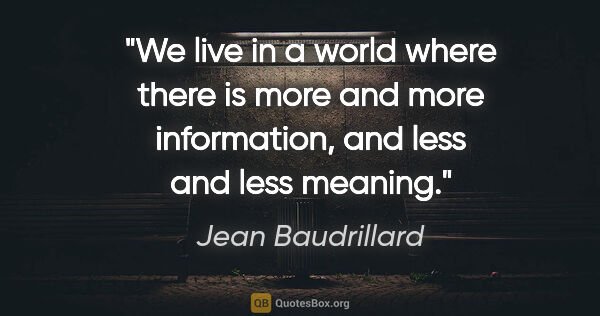Informational Quotes (page 22)

Who are we, who is each one of us, if not a combination of experiences, information, books we have read, thingsimagined? Each life is an encyclopedia, a library, an inventory of objects, a series of styles, and everything can beconstantly shuffled and reordered in every way conceivable.
Italo Calvino
Pain (any pain--emotional, physical, mental) has a message. The information it has about our life can be remarkablyspecific, but it usually falls into one of two categories: Wewould be more alive if we did more of this and Life would bemore lovely if we did less of that. Once we get the pain'smessage, and follow its advice, the pain goes away.
Peter McWilliams
We’re so caught up in our everyday lives that events of the past, like ancient stars that have burned out, are no longer in orbit around our minds. There are just too many things we have to think about every day, too many new things we have to learn. New styles, new information, new technology, new terminology … But still, no matter how much time passes, no matter what takes place in the interim, there are some things we can never assign to oblivion, memories we can never rub away. They...
Haruki Murakami
Do you have information that there's an android in the cast? I'd be glad to help you, and if I were an android would I be glad to help you?" "An android," he said, "doesn't care what happens to another android. That's one of the indications we look for." "Then," Miss Luft said, "you must be an android.
Philip K. Dick

we have created a man with not one brain but two. ... This new brain is intended to control the biological brain. ... The patient's biological brain is the peripheral terminal -- the only peripheral terminal -- for the new computer. ... And therefore the patient's biological brain, indeed his whole body, has become a terminal for the new computer. We have created a man who is one single, large, complex computer terminal. The patient is a read-out device for the new computer, and is helpless...
Michael Crichton



This thing called Contrmporary America--and its obsession with televisions, game systems, and computers_has gone a littlr far if you ask me. Some call it the Information Age, but I'd tend to say it's more the Sitting-on-one's-butt-and-letting-other-people-do-the-thinking-for-you Age.
James Patterson
